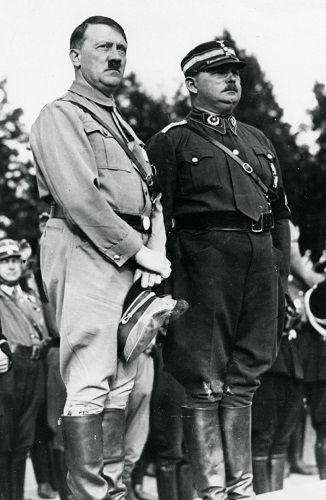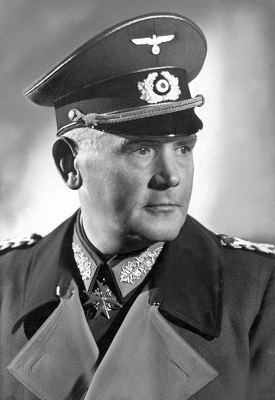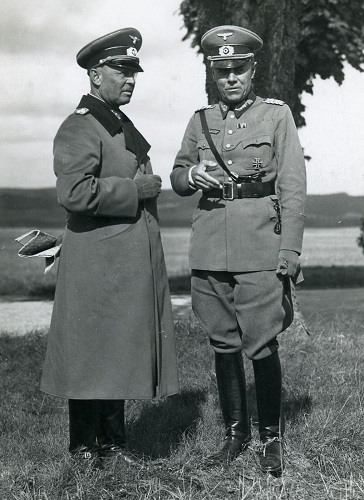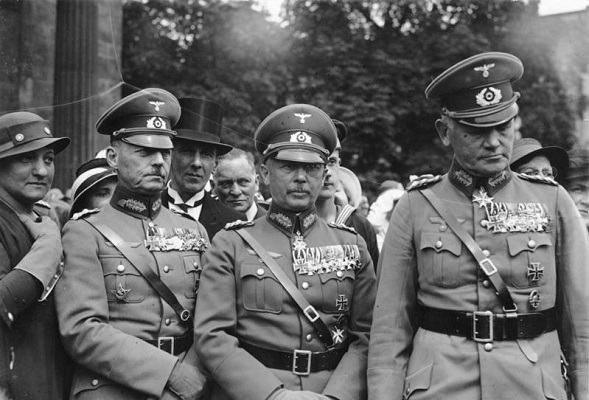|
● ● ●
Since the seventeenth century a
special bond had existed between the monarch and the officer
corps of the Prussian and later the German Army. It was that
Army, founded by the Great Elector, that bound the
heterogeneous lands of the Hohenzollerns together, and in
the fullness of time made Prussia possible. Frederick
William I and Frederick the Great habitually wore officer's uniform, thus making it a mark of
prestige and honor, reserved for the Prussian nobility—the Junker
class. Those officers gave
their oath to the King—after 1871 to the King-Emperor—personally. It
was an ancient relationship, founded in the days of the pike
and the matchlock musket, that still stood firm at the dawn
of the twentieth century.
The Army’s corporate identity was embodied
above all in the Great General Staff (Großgeneralstab) an
institution that traced its origins to the Great Elector's reign and
assumed its modern form between the Napoleonic wars and the
unification of Germany in 1870-71. The Army’s central role in these
patriotic epics increased its prestige still further, and the Great
General Staff under Field Marshal Helmuth Graf von Moltke received
much of the credit for the three victorious wars that set the seal
on German unification. In the decades leading up to the First World
War, the Great General Staff was Germany’s de facto supreme command
and highest military planning entity, its authority underscored by
the Chief of Staff’s right of immediate access to the Kaiser, the
titular supreme commander.
Defeat in the First World War, did not, as
might be supposed, fatally undermine the reputation of either the
Army or its General Staff. The latter, indeed, was abolished by the
terms of the 1919 Peace Treaty, but its spirit lived on in the
100,000-man Reichswehr, the
vestigial army permitted to Germany by the victorious powers. And
the reputation of the Army as a whole was shielded by the legend of
the “stab in the back”: the claim that the soldiers at the front had
been betrayed by the treasonous “November criminals” of 1918.

Hitler with SA leader
Ernst
Röhm. The Führer
purged his old comrade at the Army's
behest (Bundesarchiv)
Hitler’s ascent to power in January 1933
was greeted by the Army's leaders with mixed emotions. Of course
they heartily approved of his proclaimed foreign
policy goals: rearmament and the restoration of Germany’s great
power status. But they deeply disapproved of and viewed with alarm
the Party’s brown-shirted Stormtroopers (Sturmabteilung
or SA). Ernst Röhm, the SA‘s leader, aspired to make his
organization the “people’s army” of
National Socialist Germany, absorbing the Reichswehr
in the process.
To this the generals were adamantly opposed and the pressure they
brought to bear was largely responsible for Hitler’s
decision to purge the SA in 1934, killing off Röhm and his
associates in “the
Night of the Long Knives.” The alliance
between the Nazi Party and the Army against the SA was
formalized in the Deutschland Pact (June 1934), so
called because it was agreed to by Hitler and the Minister
of Defense, Colonel-General Werner von Blomberg on board the
Navy's new armored cruiser. The SA purge was launched soon after
their meeting. The fact that among its victims
were General
Kurt von Schleicher, who’d served briefly
as chancellor before Hitler’s appointment, and his former
aide, General Ferdinand von Bredow, was indeed disturbing to
the Generalität. But the Army-Nazi alliance
remained intact.
The elimination of the
SA threat was followed by Hitler’s proclamation of German
rearmament in March 1935—which included the reestablishment of the Great
General Staff in the form of the Army High Command (Oberkommando
des Heeres or OKH) Though he deeply distrusted the Army’s
leaders, the Führer realized that he needed their professional
expertise to rebuild German military power. For their part the
generals were delighted, and they confidently expected to be recognized once more as first
among equals in the German military establishment.
The reorganization
following the rearmament proclamation established a Ministry of War
and commanders-in-chief for the three branches of the armed forces (Wehrmacht):
Army (Heer), Navy (Kriegsmarine) and the new Air Force
(Luftwaffe). As head of state Hitler was supreme commander
but the functional commander-in-chief of the Wehrmacht was
Blomberg, now a field marshal, as Reich Minister of War.
But though he was a brother officer, Blomberg was viewed with suspicion
by the Army’s leaders. They feared he would exploit his position to
create an armed forces high command organization, usurping the
Army’s traditional authority as embodied in the OKH. The Generalität
also disliked Blomberg's excessive deference to
Hitler. On his own initiative the Minister of War purged
Jews from the ranks of the armed forces, added Nazi symbols
to military uniforms and flags, and altered the military
oath of allegiance in such a way as to make it an oath of
obedience to the Führer personally.

Field Marshal Werner von Blomberg
(Photo: Bundesarchiv)
In 1934, General of Artillery Werner
Freiherr von Fritsch had been appointed Chief of the Army Command,
and he was promoted to colonel-general and made Commander-in-Chief
of the Army when that office was established in 1935. Fritsch was a
deep-dyed conservative with anti-Semitic views who thoroughly
approved of Hitler’s general foreign policy. But he was also much
admired in the officer corps for his professionalism and
determination to uphold the Army’s status. Fritsch was seconded by
the Chief of the General Staff, General Ludwig Beck. He too was
generally supportive of Nazi goals but gradually became alarmed
over what he regarded as Hitler’s high-risk foreign policy.
Another key figure was General of Infantry
Gerd von Rundstedt, the senior officer of the Army by years of
service, who in 1934 was commanding
Reichswehr-Gruppenkommando 1
in Berlin, the higher military headquarters for eastern Germany. As
the doyen of the officer corps
Rundstedt wielded considerable influence.
In 1934, when the anti-Nazi General Kurt
Freiherr von Hammerstein-Equord resigned
as Chief of the Army Command, Hitler proposed to replace him with
General Walther
von Reichenau.
But Reichenau's pronounced pro-Nazi views made him unacceptable to the officer
corps and Rundstedt led a group of senior officers in opposition to
his appointment. Hitler thereupon backed down, appointing Fritsch
instead.
For strictly practical reasons, the senior leadership of the Army advocated a cautious approach to rearmament and foreign
policy. To men like Fritsch, Beck and Rundstedt it
was clear that many years must elapse before Germany would be ready
for war. The rapid expansion of the Army—in the first instance from
ten to thirty-six divisions—seemed to them over-hasty. The Generalität
was also disquieted by Hitler’s increasingly bellicose behavior on the
international stage, which they feared would precipitate Germany
into a war for which country was in no way prepared. Their increasingly
pointed objections to all this alienated Hitler—who soon hit upon
a pretext for getting rid of them and all such skeptics in uniform.

Fritsch and Beck observing Army
maneuvers, 1937 (Photo: Bundesarchiv)
In January 1938 the War Minister, Blomberg,
who was a widower, married a much younger woman of humble
background. This match initially met with Hitler’s approval as a
counterblast against what he viewed as the aristocratic snobbery
that permeated the higher ranks of the Army. The Führer even agreed to stand as witness to the marriage. But it was
soon discovered that the bride had a long criminal record as a
prostitute and had even
posed for pornographic photos. Embarrassed and enraged,
Hitler demanded and received the Field Marshal's resignation.
Probably he was not sorry to do so: The Führer had neither
forgotten nor forgiven the high-handed manner in which
Blomberg had delivered the Army's ultimatum regarding the
SA.
The Army's leaders regarded Blomberg’s
fall from power with equanimity. But the sequel dismayed them: Fritsch,
the Army Commander-in-Chief, was slapped with an accusation of
homosexual misconduct. In reality this charge was false, the result
of an intrigue by Heinrich Himmler, the SS chief, and Hermann Göring,
the commander of the Luftwaffe. The former wished to
undermine the authority of the Army leadership so as to promote the
interests of his own SS organization, while the latter wished to
prevent Fritsch from replacing Blomberg, and thereby becoming his,
Göring’s, superior.
Fritsch protested his innocence—even going
so far as to challenge Himmler to a duel—to no avail. He too was
forced to resign, being replaced by Colonel-General Walther von Brauchitsch. The Army’s senior officers were appalled and demanded a
military “court of honor” to investigate the case. This was granted
and the court exonerated Fritsch in full of the charges against him.
But Hitler refused to restore him to command of the Army, arguing
that a replacement had already taken over. Fritsch was fobbed off
with an appointment as honorary colonel-in-chief of his old
regiment, and consigned to the retired list.
Hitler exploited the
Blomberg-Fritsch
Affair to cement his personal control over the armed forces. No
replacement was named for the disgraced Minister of War. Instead the Führer took over
personally, and the War Ministry became the High Command of the
Armed Forces (Oberkommando der Wehrmacht or OKW). Its chief
was General Wilhelm Keitel, a man on whom Hitler could rely to do as
he was told. Beck, the Army Chief of Staff, resigned shortly
afterward, being replaced by General Franz Halder.
For the moment the OKH was able to preserve
some degree of independence. But inevitably its new rival, the OKW, would aspire to a
superior role, and as Hitler’s personal military headquarters and
planning staff it posed a real threat to the Army's position. Moreover, the logic of the Nazi
leadership principle (Führerprinzp) cut
against all claims of institutional autonomy: the Führer alone could
decide and decree. And this progressive centralization of
power was to be accelerated by the pressures and crises of the war
now impending. Month by month, year by year, the proud German Army
would watch helplessly as its independence withered away.
● ● ●
Copyright © 2020 by Thomas M. Gregg. All Rights
Reserved
 BACK to
WAR ROOM Front Page
|




